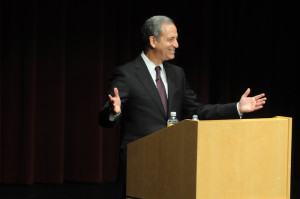Calling a Supreme Court decision “lawless” and warning of “corporate domination of our political process,” former Senator Russ Feingold (D-Wis.) spoke Monday night about the dangers stemming from the recent removal of restrictions on financial contributions to political groups.
Feingold spoke out against the Jan. 2010 Supreme Court decision in Citizens United v. Federal Election Commission, arguing that it opened the door to increased corporate influence in politics.
“The decision issued by the court’s majority was essentially a lawless decision,” Feingold said, “not only because the substance of it gave corporations free reign over our political process — which is so fundamental to our democracy — but also because of its blatant disregard for the mores and traditions of the Supreme Court in handling difficult cases.”

The 5-4 ruling lifted prior restrictions on corporate contributions to political groups. This includes donations to political action committees (PACs), which — though not directly associated with candidates or campaigns — can channel vast sums to political causes.
Feingold said that Americans must choose between a political system controlled by large corporations and one that has fair campaign finance regulations.
“The first path marks the beginning of the destruction of our campaign finance system and essentially permits corporate domination of our political process,” he said. “This dominance will include our most fundamental institutions: those that govern us, those that write and enforce our laws and regulations, those that oversee our economy and those that determine our relations with other countries, even our national security.”
Feingold identified the rise in the 1990s of “soft money” — the circumvention of limits on donations to candidates’ campaigns by donating large sums to issue-driven campaigns — as a critical juncture in campaign financing. He argued that laxer campaign finance regulations stem from changes in the electorate’s political involvement.
“Corporate-funded, right-leaning elements in this country were rocked by the power of the Internet and by mass personal involvement by average citizens,” he said. “The corporate powers in this country that want to dominate our political process saw the face of democracy and it terrified them.
“They were scared stiff that we had stopped the soft money flow, the leverage on which they relied to get both Republicans and, I’m sorry to say, too many Democrats, to ratify job-killing trade agreements, enact the Wall Street wish list of financial deregulations and pass the most fiscally irresponsible tax and budget policies in our lifetime,” Feingold added.
In response to the idea that in an age of super PACs candidates must join the fundraising race to effectively compete, Feingold urged the audience to consider the consequences of the concept. He stated his opposition to President Barack Obama’s decision to allow Cabinet members to fundraise for Priorities USA Action, a pro-Obama PAC.
“Think about what you’re doing,” Feingold argued. “Think about what you’re becoming. What’s the end if it’s going to be gazillionaires dominating the entire process?”
Audience members reflected on both Feingold’s message and candor.
“The fact that he’s no longer a senator allowed him to say a lot of things he wouldn’t regularly say,” said Tomer Perry, a graduate student in political science. “He was very critical of the Democrat and Republican parties, which is important.”
“I’m very concerned about the ongoing and strengthening movement of corporate personhood,” said Dave Mitchell ‘09.
Feingold will participate in a seminar today from 10 a.m. to 12 p.m. in Tresidder Union. Joining him will be Joshua Cohen, Marta Sutton Weeks professor of ethics in society, and Stephen Ansolabehere, Harvard professor of government.